See also
| This page or section lists people that share the same given name. If an internal link led you here, you may wish to change that link to point directly to the intended article. |
Jem is a given name, sometimes as a nickname for James, Jeremiah, Jeremy, Jemma, or Jemima, and sometimes as an anglicized version of the Turkish name Cem.
People with the name include:
| This page or section lists people that share the same given name. If an internal link led you here, you may wish to change that link to point directly to the intended article. |
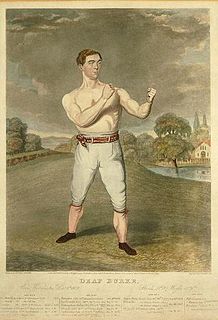
James "Deaf" Burke, was one of England's earliest boxing champions. He was also deaf.
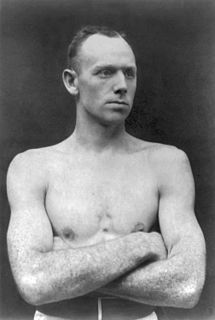
Robert James "Bob" Fitzsimmons was a British professional boxer who was the sport's first three-division world champion. He also achieved fame for beating Gentleman Jim Corbett, and he is in The Guinness Book of World Records as the lightest heavyweight champion, weighing just 165 pounds when he won the title. Nicknamed Ruby Robert and The Freckled Wonder, he took pride in his lack of scars and appeared in the ring wearing heavy woollen underwear to conceal the disparity between his trunk and leg-development.

Tom Cribb was a world champion English bare-knuckle boxer of the 19th century.

Bare-knuckle boxing is the original form of boxing, closely related to ancient combat sports. It involves two individuals fighting without boxing gloves or other padding on their hands.

John Lawrence Sullivan, known simply as John L. among his admirers, and dubbed the "Boston Strong Boy" by the press, was an American boxer recognized as the first heavyweight champion of gloved boxing, de facto reigning from February 7, 1882 to 1892. He is also generally recognized as the last heavyweight champion of bare-knuckle boxing under the London Prize Ring Rules, being a cultural icon of the late 19th century America, arguably the first boxing superstar and one of the world's highest-paid athletes of his era. Newspapers' coverage of his career, with the latest accounts of his championship fights often appearing in the headlines, and as cover stories, gave birth to sports journalism in the United States and set the pattern internationally for covering boxing events in media, and photodocumenting the prizefights.

James "Jem" Mace was an English boxing champion, primarily during the bare-knuckle era. He was born at Beeston, Norfolk. Although nicknamed "The Gypsy", he denied Romani ethnicity in his autobiography. Fighting in England, at the height of his career between 1860–66, he won the English Welterweight, Heavyweight, and Middleweight Championships and was considered one of the most scientific boxers of the era. Most impressively, he held the World Heavyweight Championship from 1870-71 while fighting in the United States.
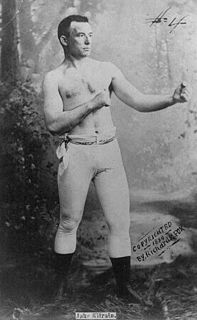
John Joseph Killion, more commonly known as Jake Kilrain, was a famous American bare-knuckle fighter and glove boxer of the 1880s.

Boxing gloves are cushioned gloves that fighters wear on their hands during boxing matches and practices. Unlike "fist-load weapons" which were designed as a lethal weapon, modern boxing gloves are non-lethal, designed to protect both the opponent's head and the fighter's hand during a bout. Sparring and other forms of boxing training have their own specialized gloves.

Simon Byrne, nicknamed "The Emerald Gem", was an Irish bare-knuckle prize fighter. The heavyweight boxing champion of Ireland, he was drawn to England by the larger sums of prize money on offer and his hopes of becoming the heavyweight champion there as well. He became one of only six fighters ever to have been involved in fatal fights as both survivor and deceased since records began in 1741.

Tom King also known as "The Fighting Sailor" was an English boxer who fought both bare-knuckle and with gloves. Strong, fast, and durable he was a skilled pugilist. One of his quirkier pre-fight rituals was to drink a tot of gin before every bout. He retired from the ring in 1863, as the Heavyweight Champion of England, following his defeat of the reigning champion Jem Mace and American contender John C. Heenan.
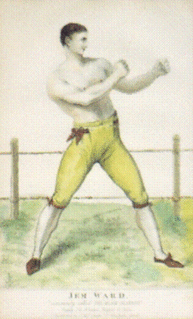
Jem Ward was an English bare-knuckle boxer. "A fine fighter and powerfully built man", he was the English heavyweight champion from 1825 until 1831. He became known for being one of the first boxers to be officially sanctioned for deliberately losing a fight. During his fighting career he was nicknamed "The Black Diamond". In his retirement he became a successful artist.
Nicholas Ward often known as Nick Ward was an English bare-knuckle fighter. Nick Ward was the heavyweight champion of England for four months in 1841. His first recorded fight was in 1835 against Harry John Lockyer. In 1840 he fought his brother's old enemy James Burke; Burke was a feared and dangerous fighter, who had killed one opponent, the champion Simon Byrne. Following the match Jem Ward had refused to fight Burke, would not hand over the championship belt or acknowledge Burke as the heavyweight champion, even after he was acquitted of murder. Nick Ward won the bout against Burke when his gang of supporters forced the referee to disqualify Burke for an alleged foul. This winning pattern was repeated when in February 1841 Ward became heavyweight champion. He beat Ben Caunt, the reigning champion, when Caunt was disqualified, after the referee succumbed to pressure from the crowd claiming Caunt hit Ward while he was down. In May of the same year Caunt legitimately beat Ward and regained his title. At this time boxing was governed by the less than arduous London Prize Ring rules. The more strict and fair Queensbury rules were not implemented until much later in the century.
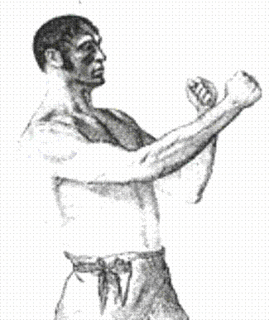
Tom Spring was an English bare-knuckle fighter. He was heavyweight champion of England from 1821 until his retirement in 1824. After his retirement he became landlord of the Castle Inn at Holborn in London, where he arranged the patronage and contracts of many of the major boxing events of the period while overseeing fair play in the ring.
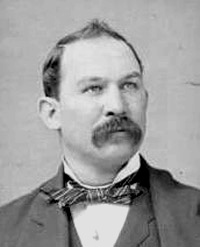
Joseph Goss was an English bare knuckle boxer. After defeating Tom Allen in Boone County, Kentucky, he held the American and what many boxing historians now consider the World Heavyweight boxing championship from 7 September 1876 to 30 May 1880. Although he rarely scaled more than 160 pounds, the clever and aggressive Goss routinely fought men both bigger and heavier than himself.
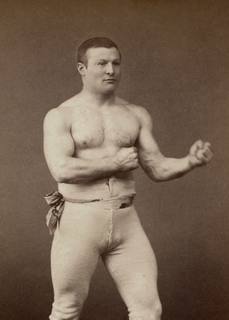
Jem Smith was a bare-knuckle prize fighter and Heavyweight Champion of England in the late 19th century and into the early 20th century. In 2010 he was inducted into the Bare Knuckle Boxing Hall of Fame.
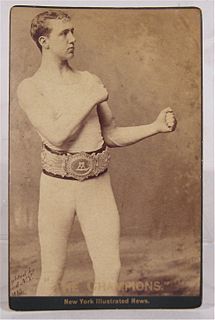
Charles Watson "Charley" Mitchell was an English world heavyweight boxing title contender and lightweight champion.
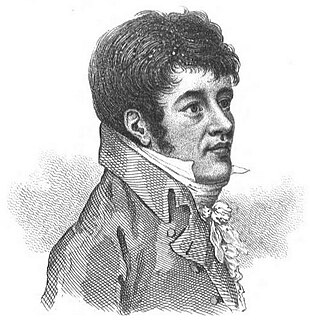
Henry "Hen" Pearce was an English bare-knuckle prizefighter who fought under the London Prize Ring rules and was the recognised English Champion from 1804 until his retirement due to ill health in 1807.

Paddington Jones was a British bare-knuckle boxer from 1785 to 1805. He is best remembered for fighting and seconding the most number of fights for any boxer of his era. His bout with Jem Belcher was considered by a few historians to be for a Championship of England, though the boxers differed significantly in weight. There was no formal sanctioning body to confer global or even national championship status on the fight during the period, and no real formal recognition of weight classes at the time.
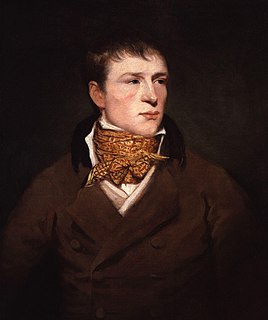
James Belcher, also known as Jem Belcher, was an English bare-knuckle prize-fighter and Champion of All England 1800–1805.
Barney is a masculine given name, often a short form (hypocorism) of Barnard, Barnett and other names, and occasionally a nickname. It is derived from the Slavic name Barni, the pet form of Barnim, which means "defender", and it was formerly a popular name throughout Poland. Notable people with the name include: